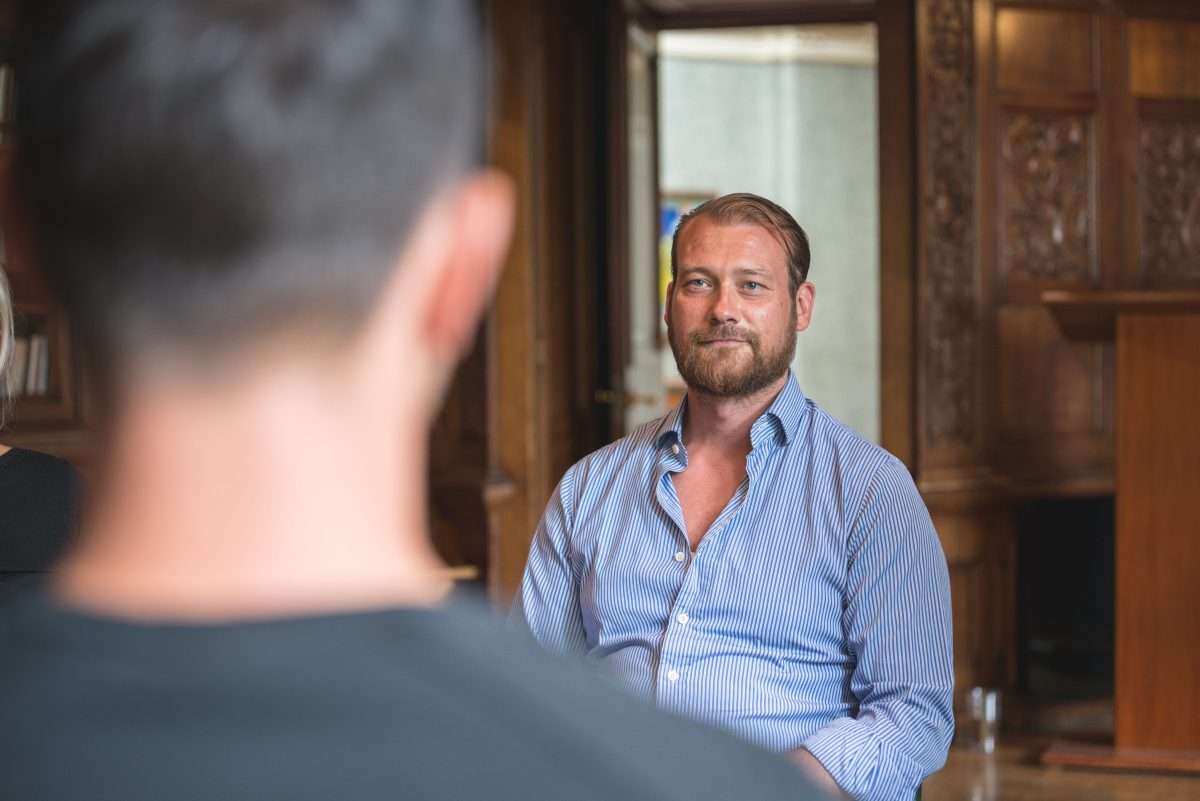
CBT to Treat Addiction
Why is CBT Used in Addiction Treatment?
Cognitive behavioural therapy (CBT) for addiction is an evidence-based and successful treatment.1 Using CBT for addiction has been shown to help improve abstinence and prevent relapses.2,3
CBT is a widely used psychological therapy. CBT sessions teach you to identify destructive thoughts and behaviours associated with your addiction. Your CBT therapist can work with you to put realistic strategies in place to avoid or change these patterns. These strategies can be used long-term to make maintaining abstinence easier.
At Castle Craig, we understand how useful CBT is in addiction recovery. That’s why we offer it as part of our personalised addiction treatment plans.
The more you practice, the easier it becomes. Eventually, after 28 days in residential rehab, you will have a variety of skills to take with you and apply to everyday real life.
I am here for Alcohol | Drugs | Other addiction

Compassion & Respect
What is CBT?
Cognitive behavioural therapy is a type of psychological treatment based on thinking and talking. It aims to identify negative beliefs and assumptions that contribute to destructive behaviours. Trained professionals can challenge these thoughts and actions in a safe environment.
Cognitive behavioural therapy is a method based on concepts from the 1960s.4 Over the last few decades it has gained popularity and is now a recommended treatment in the UK for mental health problems.5 CBT can be useful on its own, or alongside medication.
Many people can benefit from CBT, particularly those with mental health conditions.5 Some of these conditions include addiction, depression, anxiety and post-traumatic stress disorder (PTSD). People with these conditions should speak to a professional to consider whether cognitive behavioural therapy would be beneficial.7
CBT can be delivered from a clinic in the community, or in residential care. Sessions may be delivered on an individual or group basis, depending on the needs of the individual. 1
Therapy extends over multiple sessions which normally last at least one month. An example schedule would be weekly one-hour appointments over three months. For some individuals, it can be more beneficial to stay in residential care for CBT. A doctor or therapist will recommend the duration of treatment and structure the programme to suit your needs.
An important feature of cognitive behavioural therapy is homework 8 Your therapist will work with you to agree on certain exercises for you to practise between sessions. This allows new knowledge from sessions to be slowly integrated into personal environments. You can assess how you are progressing outside of CBT and discuss this at the next session.
By the end of CBT, new thinking patterns and skills are in place to prevent the continuation of harmful behaviours. When someone completes a CBT programme, these skills can be used life-long to cope with many situations.8

How Does CBT Work?
Cognitive behavioural therapy works by changing the way someone thinks and acts. CBT uses psychological theories, specifically the cognitive triangle, to make these changes.7 This triangle has three interacting elements – thoughts, feelings, and actions. 7 Thoughts affect feelings and actions, and actions affect thoughts and feelings. This cycle means that unhealthy mindsets often lead to unhealthy behaviours.
The thoughts, feelings and behaviours cycle
Here is an example of how a negative thought affects someone’s emotions and actions:
At work, someone overheard colleagues saying their names in a private conversation.
Thought: ‘They are saying horrible things about me.’
Feelings: Anxious, paranoid and upset.
Behaviours: For the rest of the day they actively avoid their colleagues and go home early pretending to be sick.
How Can CBT Help You to Break Negative Cycles?
A crucial part of cognitive behavioural therapy is identifying the thoughts that cause distress. Everyone has unique thoughts and beliefs based on past events, some of which may be harmful.9 These thoughts can change someone’s perception of their own lives and their view of the world. To alter this perception, a psychologist helps you explore your thought processes.9 People are often not aware of their core beliefs so an expert will ask questions to help you find them.
The next step is discussing how this mindset has affected your current situation. Cognitive behavioural therapy teaches you how to avoid or cope with triggers of these thoughts, to break the unhealthy habit cycle.7 A professional will simulate provoking situations so individuals can practise challenging their thoughts.7 The final goal is to use these strategies outside of CBT for long-term success. 1
To use the same workplace example as earlier, CBT could be used to help that person gain more self-confidence at work. Let’s say that the person’s goal is to have better self-esteem at work. The therapist would work with them to uncover why they have low self-esteem at work. The reason for this might be that they hold a core belief that no one likes them. This core belief means that they assume their colleagues are saying hurtful things about them. The therapist could then work with the person to come up with healthy coping strategies to overcome these distressing feelings.

Download Our Brochure
Can CBT Treat Addiction?
Cognitive behavioural therapy can be very effective in treating addiction.2 CBT can treat the psychological aspects of the condition and teach you how to manage them. Drug, alcohol, internet and gambling addictions are among some of the many addictions CBT can treat. 3,6,10
Management of addiction is different for every person. Professionals might advise cognitive behavioural therapy for addiction alongside other treatments. These could be other psychological therapies or medical management like tablets. When more than one treatment is advised, participating in CBT can increase the effectiveness of the others.6
CBT for Drugs and Alcohol
Treating drug and alcohol addictions with cognitive behavioural therapy has proven to be successful in many studies. They have shown that:
- Two-thirds of people with substance use disorders who receive CBT will achieve better outcomes.2
- One-third of those individuals will achieve abstinence with CBT alone.2
- Overall, CBT reduced substance use in 79% of study participants.6
CBT For Gambling Addiction
Another addiction that cognitive behavioural therapy can successfully treat is gambling.10 Research into gambling management has found high abstinence rates at six months post-CBT. One study found that 64% of people with gambling addictions treated with CBT remained abstinent during the treatment period.11 There is also evidence suggesting that this type of addiction is best treated with intensive and frequent therapy.10

What Makes CBT an Effective Treatment for Addiction?
There are several factors that make CBT for addiction so effective. One of the primary reasons is regular participation in homework.8 Research indicates that if someone completes the majority of homework, they have reduced drug use one year after CBT.
12 These people also displayed a greater quantity and quality of coping mechanism skills in real situations.8
Another powerful aspect of CBT is that it can be an individual or group therapy. They are both equally effective and have unique benefits.6 Group therapy allows you to connect with people who understand your situation. This creates accountability which can be highly motivating for yourself and others. Individual therapy provides a confidential setting for privacy when discussing personal matters.
Benefits of CBT in Addiction Treatment
There are many other short and long-term benefits to cognitive behavioural therapy. People who take part in CBT are less likely to drop out than those in other therapies.2,3 This suggests that the benefits of CBT inspire people to continue with treatment.
Short-term benefits:
- Realistic goals give people a sense of achievement on a regular basis
- There is instant and continuous support from professionals
- It can be completed in a relatively short space of time
Long-term benefits:
- Abstinence and reduction in unhealthy behaviours
- An improved relationship with yourself and others
- Development of transferable skills that can be used in other areas of life, like employment
- Increased self-esteem

Compassion & Respect
How Can I Find CBT for Addiction Treatment?
A trained professional can provide cognitive behavioural therapy for addiction in a suitable environment.1 This could be in a clinic, in a hospital, or in a residential facility.
Castle Craig offers world-renowned residential care for people with addictions. We specialise in addiction management and acknowledge that CBT is a successful treatment. Although staying in a residential facility is not essential for CBT, it has many advantages:
- Cognitive behaviour therapy for addiction can be difficult. Residential care can provide continuous support for you, medically and emotionally.
- You will be around other people who understand your condition.
- You can explore other treatments alongside CBT if they are advised by a professional.
Castle Craig is a safe and confidential space, free of judgement. Our experienced doctors and therapists are here to guide you through our evidence-based treatment programmes.
To find out more about Castle Craig’s cognitive behavioural therapy for addiction, contact us today.
References
- McHugh RK, Hearon BA, Otto MW. Cognitive behavioural therapy for substance use disorders. Psychiatr Clin North Am. 2010;33(3):511-525.
- Dutra L, Stathopoulou G, Basden SL, Leyro TM, Powers MB, Otto MW. A meta-analytic review of psychosocial interventions for substance use disorders. Am J Psychiatry. 2008;165(2):179-187.
- Wölfling K, Müller KW, Dreier M, et al. Efficacy of short-term treatment of internet and computer game addiction: a randomized clinical trial. JAMA Psychiatry. 2019;76(10):1018-1025.
- Beck JS. Cognitive therapy: basics and beyond. J Psychother Pract Res. 1997;6(1):71-80.
- Common mental health problems: identification and pathway to care. National Institute for Health and Care Excellence. Published 2011. Accessed March 2022.
- Magill M, Ray LA. Cognitive-behavioural treatment with adult alcohol and illicit drug users: a meta-analysis of randomized controlled trials. J Stud Alcohol Drugs. 2009;70(4):516-527.
- Fenn K, Byrne M. The key principles of cognitive behavioural therapy. InnovAiT. 2013;6(9):579-585.
- Decker SE, Kiluk BD, Frankforter T, Babuscio T, Nich C, Carroll KM. Just showing up is not enough: homework adherence and outcome in cognitive-behavioural therapy for cocaine dependence. J Consult Clin Psychol. 2016;84(10):907-912.
- Carroll KM, Kiluk BD. Cognitive behavioural interventions for alcohol and drug use disorders: through the stage model and back again. Psychol Addict Behav. 2017;31(8):847-861.
- Rash CJ, Petry NM. Psychological treatments for gambling disorder. Psychol Res Behav Manag. 2014;7:285-295.
- Grant JE, Donahue CB, Odlaug BL, Kim SW, Miller MJ, Petry NM. Imaginal desensitisation plus motivational interviewing for pathological gambling: randomised controlled trial. Br J Psychiatry. 2009;195(3):266-267.
- Carroll KM, Nich C, Ball SA. Practice makes progress? Homework assignments and outcome in the treatment of cocaine dependence. J Consult Clin Psychol. 2005;73(4):749-755.
How Can Castle Craig Help?
Who will I speak to when I call Castle Craig?
When you call you will reach our Help Centre team who will give you all the information you need to help you decide whether to choose treatment at Castle Craig. If you decide that you would like to have a free screening assessment you will be asked a series of questions to build up a picture of your medical and drug use history as well as any mental health issues you are facing. If you decide you want to proceed with treatment you will be put in touch with our admissions case managers who will guide you through the admissions process.
How long is the rehab programme?
Residential rehab treatment starts at 4 weeks and can go up to 12+ weeks. Research shows us that the longer you stay in rehab and are part of the residential therapy programme, the longer the likelihood of continued abstinence and stable recovery.
How do I pay for rehab?
One concern we sometimes hear from people is how they will fund their rehab treatment. You can pay for treatment at Castle Craig privately, or through medical insurance, and some people receive funding through the NHS. The cost of rehab varies depending on what kind of accommodation you choose.
What happens at the end of my treatment?
Castle Craig thoroughly prepares patients before departure by creating a personalised continuing care plan which is formulated following discussions with the medical and therapeutic team. We offer an online aftercare programme which runs for 24 weeks after leaving treatment, in order to ensure a smooth transition back into your everyday life. Patients leaving treatment automatically join our Recovery Club where they can stay connected via our annual reunion, events, online workshops and recovery newsletters.